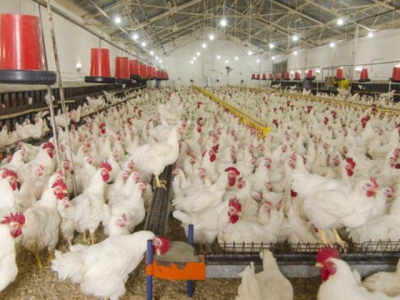Mareks disease genome study may aid control in poultry

Study illustrates how easily virulent Marek's disease viruses can persist and spread, but new strains do not appear to be more virulent than older stains.
Marek's disease — a highly contagious viral disease caused by a herpesvirus — is a constant threat to poultry worldwide, but it is also one of the most preventable diseases with vaccination, according to the U.S. Department of Agriculture's Agricultural Research Service (ARS).
However, while vaccines prevent poultry from becoming sick with symptoms of the virus, they do not prevent virus spread and mutation, which is considered the main reason for increased virus virulence, or severity, in field strains in U.S. commercial flocks, ARS said.
To help improve the control of Marek's disease, ARS veterinary medical officer John Dunn and his team at the Avian Disease & Oncology Laboratory in East Lansing, Mich., analyzed Marek's disease genomes to find out which genes are mostly associated with virulence. ARS said the team sequenced DNA from 70 virus strains, collected over the years from across the U.S., and identified significant genetic variants (mutations) associated with Marek's disease virulence.
The study, recently published in the Journal of General Virology, also revealed that high virulence strains collected from the same farms in the last three years and in the 1990s were nearly identical. This illustrates the ease with which virulent Marek's disease viruses can persist and spread among flocks as well as the difficulty in eradicating the disease from a farm once established, Dunn said.
Another finding worth noting was that new strains were no more virulent than older strains, which may suggest that current management and vaccine practices have slowed the ongoing evolution of the virus, according to Dunn.
Litter management to reduce viruses in the environment and optimize the microbial environment of the chickens is a critical component of bird health, even with good protection from vaccines, ARS said.
What separates this research from other studies is the uniformity of how virus strains were phenotyped, Dunn said, explaining that only U.S. strains were analyzed, which were all collected, isolated and phenotyped in the same inbred chicken lines and controlled conditions using the same vaccines and control viruses. In addition, all strains were phenotyped by one of two ARS veterinarians.
Dunn said the next step is to validate markers associated with virulence to determine if these markers may provide an alternative to live bird testing for evaluating the virulence of new Marek's disease field strains.
Dunn noted that the U.S. Poultry & Egg Assn. contributed research funding for this project.
Source: USDA Agricultural Research Service, which is solely responsible for the information provided and is wholly owned by the source. Informa Business Media and all its subsidiaries are not responsible for any of the content contained in this information asset.
Related news
 Ducks require more choline than broilers
Ducks require more choline than broilers Choline dietary specifications for broilers are lower, indicating once more that ducks should not be treated as broilers in terms of feed formulation.
 Perinatal imprinting in poultry benefits performance
Perinatal imprinting in poultry benefits performance Mounting evidence shows that what chicks are fed around the time of hatching influences a bird’s performance and its nutrient requirement in later life.
 Brazilian ginseng may boost poultry feed efficiency, egg shelf life
Brazilian ginseng may boost poultry feed efficiency, egg shelf life Supplementing sorghum-based quail diets with Brazilian ginseng may improve bird feed efficiency and lengthen the shelf life of eggs, say researchers.